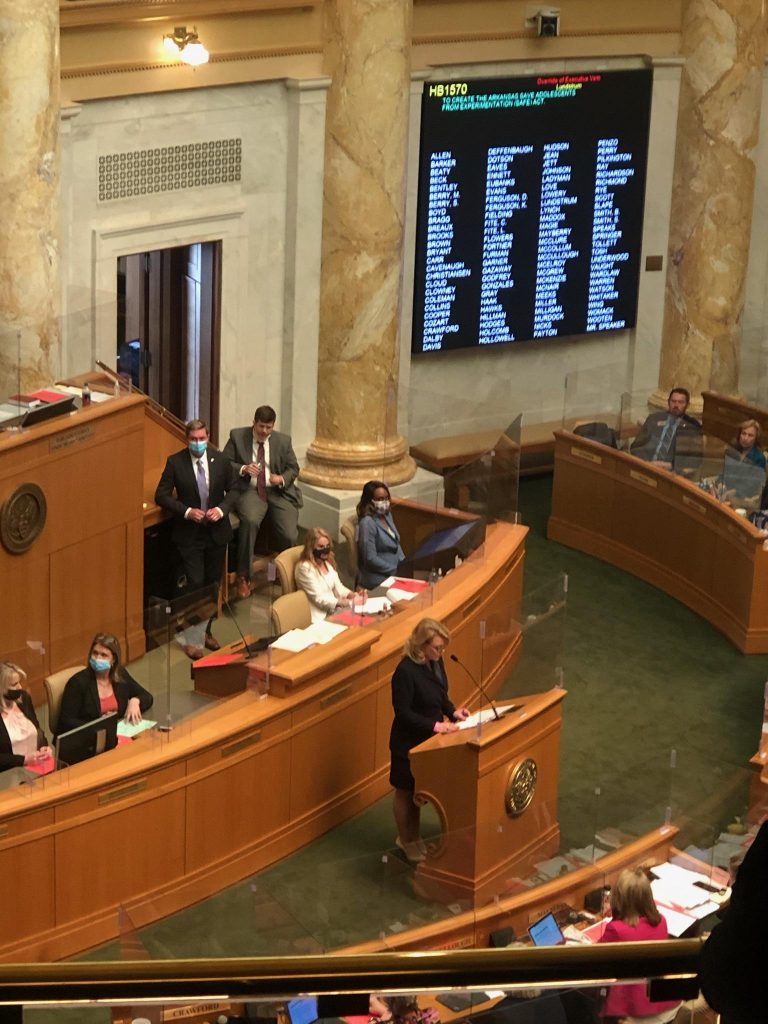
One year ago today the Arkansas Legislature voted to enact the Save Adolescents From Experimentation (SAFE) Act by Rep. Robin Lundstrum (R – Springdale) and Sen. Alan Clark (R – Lonsdale).
The SAFE Act protects children from sex-reassignment procedures, puberty blockers, and cross-sex hormones.
Here’s a brief recap of the measure’s history and what has happened since its passage:
On February 25, 2021, Rep. Robin Lundstrum (R – Springdale) and Sen. Alan Clark (R – Lonsdale) filed H.B. 1570, the Save Adolescents From Experimentation (SAFE) Act.
In a nutshell, the SAFE Act prohibits sex-reassignment procedures on children. It also prevents funding of sex-reassignment procedures performed on children.
Gender-reassignment surgeries can leave children sterilized and scarred for life, and medical researchers do not know the long term effects these procedures and therapies can have on kids. That is why many people equate them with experimenting on children.
On March 9, 2021, the SAFE Act passed the House Public Health Committee by a vote of 12 to 2, and it passed the entire Arkansas House of Representatives by a vote of 70 to 22 the following day.
Along the way, pro-LGBT organizations attacked the bill.
The ACLU claimed that the SAFE Act would ban “trans youth from accessing health care and health insurance.”
But groups like the Heritage Foundation pointed out that the SAFE Act does no such thing. The SAFE Act does not deny healthcare to anybody. It simply prohibits healthcare providers from performing or paying for sex-change procedures on children.
The Senate Public Health Committee passed the SAFE Act on Monday, March 22, 2021, and the full Arkansas Senate passed it the following week by a vote of 28 to 7.
Rev. Franklin Graham, Tony Perkins from Family Research Council, and the Heritage Foundation all issued statements supporting the SAFE Act.
However, Governor Asa Hutchinson vetoed the SAFE Act on April 5, 2021.
The following day — on April 6 — the Arkansas House and Arkansas Senate overwhelmingly voted to override the governor’s veto.
The SAFE Act was officially slated to take effect in July of 2021. However, the ACLU indicated in May that it would challenge the SAFE Act in court.
Meanwhile, on May 5 a major hospital in Sweden announced it would no longer give puberty blockers and cross-sex hormones to children under the age of 16, and that giving puberty blockers and cross-sex hormones to children ages 16 – 18 “should be regarded as experimental.” This echoed what many experts said during the debate surrounding Arkansas’ SAFE Act.
The ACLU filed the lawsuit over the SAFE Act on May 25, 2021.
On June 17 the Biden Administration weighed in against the SAFE Act, and six business organizations filed an amicus brief opposing the SAFE Act on July 2.
July 21, 2021, U.S. District Judge James Moody temporarily blocked the state from enforcing the SAFE Act while the lawsuit progresses.
On August 20 Arkansas Attorney General Leslie Rutledge asked the Eighth Circuit to lift Judge Moody’s order so that the state could start enforcing the law right away. That appeal is pending in federal court.
Meanwhile, the lawsuit over the SAFE Act’s constitutionality is still in Judge Moody’s court.
On February 28, 2022, the U.S. District Court in Little Rock announced the SAFE Act would go to trial sometime during the week of October 17, 2022. The court had previously scheduled the trial to take place during the week of July 25, 2022, but apparently chose to reschedule it.
Arkansas’ SAFE Act protects children.
Gender transition procedures, puberty blockers, and hormone replacements can sterilize children and leave them permanently scarred. The Save Adolescents From Experimentation Act protects children from these procedures.
We believe federal courts ultimately will recognize that fact and uphold this good law as constitutional.




